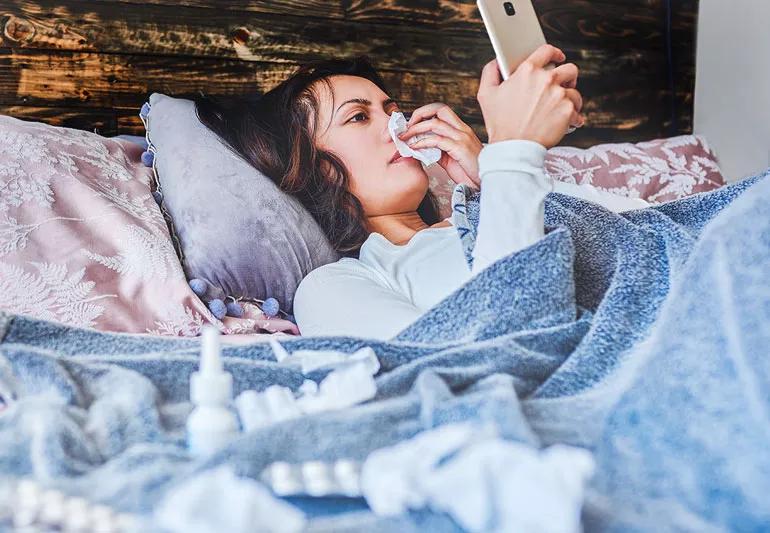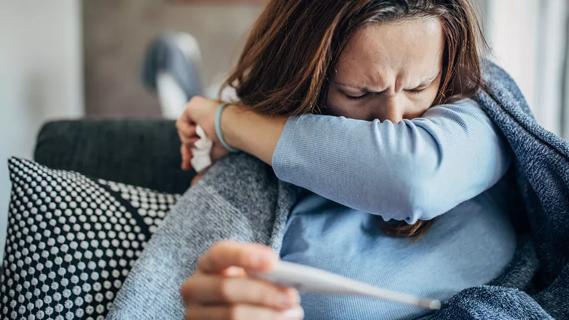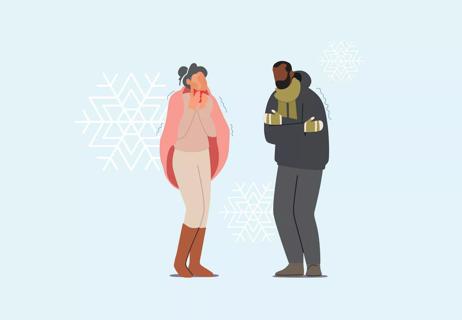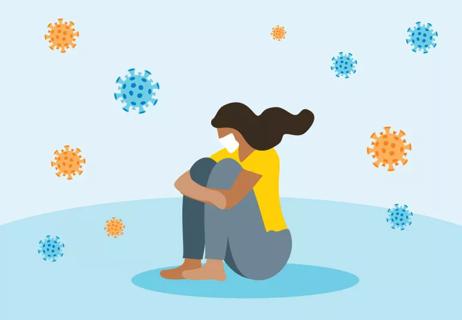Advertisement
Colds and the flu are still lurking this winter

It’s bound to happen every winter. It starts as a few sniffles and then, suddenly, you get hit with a nasty cold or flu that knocks you out of commission for a few days.
Advertisement
Cleveland Clinic is a non-profit academic medical center. Advertising on our site helps support our mission. We do not endorse non-Cleveland Clinic products or services. Policy
Thanks to the ongoing COVID-19 pandemic, though, things are a bit different right now. For starters, COVID-19 remains the most serious concern when it comes to winter-time illness and virus. But another result has been a decrease in other illnesses.
According to the Centers for Disease Control and Prevention (CDC), cases for the 2020-2021 flu season remain unusually low. This is in large part to the continued use of preventive measures in place thanks to the pandemic. But that doesn’t mean you’re in the clear from the flu, cold and other cold-weather illnesses.
Critical care specialist Rachel Scheraga, MD, spoke with us about the risks of getting sick even in isolation and what you can do to best prevent yourself from getting sick when the temperature drops.
The idea that it is impossible to get sick while social distancing is overlooking certain aspects of our lives. “We haven’t seen a lot of flu,” Dr. Scheraga notes, “but many of us are still occasionally doing essential tasks despite the pandemic, whether it’s going to the store, work or sending our kids to school.”
All of these activities, even if you’re socially distanced or doing your best to remain isolated, can still lead to illness thanks to how long cold and flu viruses can live on surfaces, she says.
Although we still don’t know exactly how long they can live on surfaces, one study showed that the flu virus can live on a hard surface for 24-to-48 hours. And it’s still possible to come into contact with someone carrying one of those viruses.
It can sometimes feel like it’s just inevitable that you’ll get sick with a cold or a bug at some point during any winter regardless of pandemic isolation. That’s not necessarily the case, though, according to Dr. Scheraga.
“It varies from individual to individual,” she says, “and depends on someone’s immune status. Some people are just more susceptible to being infected. Even in prior winters, some people just don’t get sick while others always do.”
But, she adds, illnesses will still likely be lower this winter. “Overall, the cold and flu cases will be down because of these new social distancing practices and we’re being more diligent about hand hygiene and disinfecting.”
Even while practicing basic social distancing guidelines, there are other ways illness can make its way into your home.
Advertisement
Chief among them would be adults who have to go to work and children who are still attending in-person school. With schools across the country adopting different approaches during the pandemic – remote learning, in-person learning or even a hybrid – the pattern of your children bringing home illnesses they picked up from classmates might differ from previous years. But that risk remains
The same goes for workers in your home who have to report to jobs in person. “Any kid or adult that has to go to these places, that’s going to increase your risk of being exposed to COVID-19 and other illnesses,” Dr. Scheraga confirms. “There are more viruses going around during the winter than summer because of how viruses live and replicate.”
One thing to be aware of, Dr. Scheraga also advises, is the nature of overlapping symptoms, particularly between the flu and COVID-19. From headaches to fever to coughing, it can be hard to tell sometimes.
The same issue can come up for people who might see overlapping symptoms between COVID-19, the common cold and allergies when the change of seasons approaches.
“When you get sick and you’re having these cold or flu-like symptoms, it’s still important to contact your health care provider,” she says. “In some cases, it can be impossible to tell the difference without a COVID-19 test and respiratory viral panel, so your provider will be able to provide specific treatment.”
No matter the situation, there are basic hygiene practices that will help curtail your risk of picking up those non-COVID-19 illnesses – and COVID-19, as well.
Also, always be sure to get your flu shot every season, a big factor in helping you stay as healthy as possible all winter.
“Better hand hygiene and disinfecting surfaces is a big key to staying healthy,” Dr. Scheraga says. But continued isolation is also a big factor. “If someone in your household is sick, try to self-isolate in your home,” she says. “Granted, you may not be able to but if you can separate the ill family member from the rest of your household as much as possible, that can help prevent the illness from spreading.”
Advertisement
Learn more about our editorial process.
Advertisement

You can help strengthen your child’s immune system by focusing on hand washing and staying up-to-date on their vaccines

Start slowly with clear fluids, and then move to bland, easy-to-digest foods

Symptoms can overlap and be hard to distinguish, but there are some telltale differences

It’s best to treat flu-like symptoms as if you have COVID-19

The flu, RSV, COVID-19, pneumonia and more typically circulate during cold weather months

While it typically starts in October, vaccine effectiveness can affect its duration and severity

Get vaccinated, consider wearing a mask and stock your medicine cabinet

Influenza puts stress on your body and can lead to serious conditions like pneumonia or stroke

Focus on your body’s metabolic set point by eating healthy foods, making exercise a part of your routine and reducing stress

PFAS chemicals may make life easier — but they aren’t always so easy on the human body

While there’s little risk in trying this hair care treatment, there isn’t much science to back up the claims